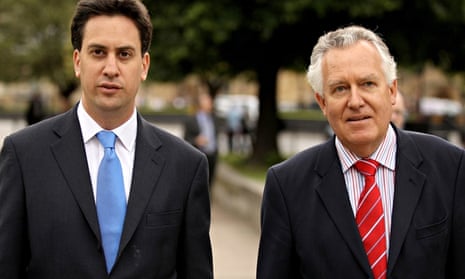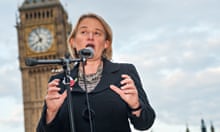Labour should embrace bolder policies on equality, public spending and a graduate tax partly to combat the growing threat to its left posed by the Green party, a former Labour cabinet minister and close ally of Ed Miliband has warned.
Peter Hain told the Guardian: “Labour needs to be more radical to counter the threat of the Greens.” His call comes as the party weighs its response to the Greens’ surge in the polls, partly fuelled by their exclusion from TV debates, but also an evident desire on the left for a more radical option.
Hain is calling for a seven-point equality programme, including an effective income tax rate of 62% on higher earners, a financial transactions tax, stamp duty on football transfer fees and reforms to inheritance tax to “make the tax as progressive as capital transfer tax was 40 years ago”. He also proposes a higher rate of VAT on luxury goods.
His proposals come in a book out next week – called Back to the Future of Socialism, in which he revisits the thinking of Anthony Crosland – and argues that Miliband may need to go further to break with New Labour.
Hain said: “It’s vital Labour become not just the reds but also the greens of British politics – both to lead the fight against climate change and to ensure natural Labour sympathisers do not inadvertently allow the anti-green David Cameron to remain prime minister by voting for the Green party.”
The Greens are currently polling just above the Liberal Democrats and are now beginning to threaten the linchpin of Labour’s election strategy – a shift of disillusioned leftwing Lib Dems to Labour. In a possible sign of the Greens’ influence, Labour announced it was likely to back a moratorium on fracking in a Commons vote next week. Ipsos Mori points to Labour failing to win as many as 15 target seats if the Greens poll around 9%.
Hain said Labour should scrap the reduced rate at which employees on high earnings pay national insurance contributions (2% in 2014), so they pay at the standard rate (12% in 2014) on all their earnings: “Contributions paid by employers are already charged at a standard rate (13.8% in 2014) all the way up the earnings scale.”
He writes: “The effect of scrapping the upper earnings limit would be to raise the top rate of income tax and national insurance combined from 47% to 62%.”
The switch would produce between £6bn and £11bn annually, he says, adding that a 62% rate “is well within the realm of practical politics, especially given the grotesque and widening inequality in modern Britain”.
He asks: “Why should people on high earnings pay standard rate national insurance contributions on only part of their earnings when lower paid people must pay contributions on all their earnings?”
Hain said if Labour backed a financial transaction tax levied at up to 0.5% on currency deals, “it could raise a phenomenal £20bn annually in the UK”.
He also proposes a graduate tax set at 2% for those earning between £10,000 and £25,000, adding the clincher that it would feel very much lower for students than current arrangements. He said a graduate tax would also favour citizenship and community over the privatisation favoured by neoliberals – “exactly where a democratic socialist Britain should be”.
The leftwing pressure group Compass in a new pamphlet has also responded to the Greens’ progress by calling for a more radical manifesto, including renationalisation of rail and a serious commitment to a living wage. By contrast the centrist Progress group argued it would be fatal to get into a policy bidding war with the Greens.
Labour has appointed shadow justice secretary Sadiq Khan to run its anti-Green unit, but the party is cautious about mounting a full scale assault on a group of idealistic and well informed voters.
Miliband’s office has also realised that the continuing controversy over the exclusion of the Greens from the TV leaders’ debates is fuelling the surge in Green party membership. Labour recognises that it badly needs the debate controversy settled, and accuses Cameron of prolonging the dispute in an attempt to promote the Greens at Miliband’s expense.




Comments (…)
Sign in or create your Guardian account to join the discussion